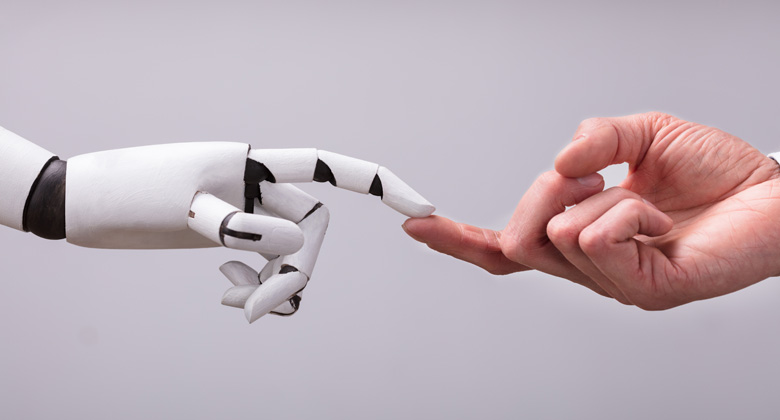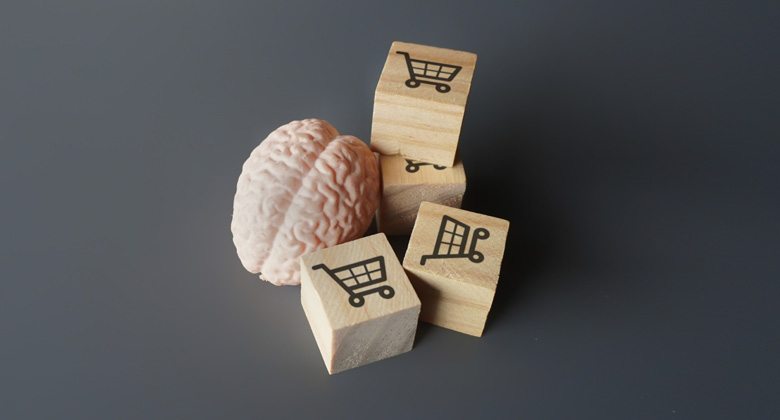How to Use AI to Upgrade Your Retail Marketing Automation
Over the past few years in the digital marketing industry, platforms have released new and exciting technology that is completely changing the marketing world forever.
Artificial intelligence has sneaked up, and it is no secret that it has the power to ultimately transform the marketing strategy of your business. The use of AI tools, in retail specifically, has created a way for companies to bring customers a whole new experience and cater their experience to match their needs.
Aside from AI tools, another huge upgrade to digital marketing that many are implementing today is marketing automation. Marketing automation essentially refers to software that allows you to automate repetitive marketing tasks. Automating the daily tasks that occur digitally, such as email and social media, saves you time, money, and resources.
This is an industry that’s very much thriving at the moment. In fact, revenue is expected to increase by 12.6 per cent this year alone!
In this retail marketing automation guide, we will discuss how to use AI for your marketing automation strategy.
Marketing Automation in Retail
When used effectively, AI marketing automation is a powerful tool that businesses of all types can incorporate into their content marketing strategy to transform how their content is distributed.
In fact, a recent study by Statista shows that 28% of marketers have described their marketing automation efforts as very successful in achieving their marketing goals!
Specifically focusing on retail, these tools are heavily used to get content in the eyes of target customers. Odds are that you have received an email from a company titled something along the lines of “SALE”, “NEW SUMMER LINE”, etc. Whenever you receive a mass email like this, that is the use of retail marketing automation.
Retail companies use this type of software to schedule content to be released to a large group of people at a specific time. Whether it is scheduling a post to go live on a social platform such as Instagram or YouTube, or scheduling a mass email to be sent out at a specific time, this tool gives marketers the ability to control exactly when content will be released without having to physically send it out at that time.
This is key for releasing information about sales or events on specific days, holidays, or even for automated responses to let customers know smaller details, such as that you have proceeded their order, seen their request, or are out of the office.
While marketing automation is a fantastic tool, it’s most effective when combined with other marketing technologies, especially AI. AI-powered eCommerce merchandising is critical for ensuring that your customers receive the information they need, as well as gathering insights to improve how you market. Whether it is through ChatBots or personalised recommenders, AI tools work hand in hand with effectively upgrading your marketing automation strategy.
The Role of AI in Retail Marketing Automation
AI is shaking things up in the best way possible when it comes to marketing automation. Imagine knowing exactly what your customers want and when they want it! AI makes this possible, so let’s take a look at the various ways it’s doing so.
Creating Personalised Shopping Experiences
Imagine walking into a store and having the perfect items laid out just for you. That’s what AI does in the digital world.
By crunching numbers and analysing what customers like, it helps create personalised shopping experiences.
Whether it’s suggesting products based on past purchases or predicting what you might like, AI makes shopping feel like it was tailor-made for each customer.
Perfect Timing with Smart Content
Have you ever noticed how sometimes you get an email or see a post just when you’re thinking about a product? You feel like there must be a spy in your home or that your computer is listening to you! But really, that’s AI in action.
It helps retailers send out content at just the right time, making sure their messages don’t get lost in the noise. This means higher engagement and more people clicking that “buy” button.
Chatbots – Your 24/7 Helpers
Chatbots are like the friendly store assistants of the online world. They’re there to answer questions, offer recommendations, and even help with customer service issues.
Plus, chatbots are available 24/7, so customers get the help they need when they need it. This not only keeps customers happy but also lets your team focus on the big stuff.
Insights That Matter
AI is also a data wizard. It gathers and analyses tons of data, giving retailers insights into what’s working and what’s not.
This means you can fine-tune your strategies, spot trends, and stay ahead of the curve. It’s all about making smart, data-driven decisions that lead to better outcomes.
Incorporating AI into your retail marketing strategy isn’t just about keeping up with trends; it’s about leading the way!
How to Create a Marketing Automation Strategy?
1. Determine your goal
In order to create a marketing automation strategy, you must determine what you want out of it. Do you want more social followers or increased shoe sales? Choose one and build on that.
2. Use AI Tools
Using AI tools is critical to ensure a successful marketing plan. Not only will they boost your social automation, but also give your customers a more enjoyable and effective experience.
Recent advancements in AI, such as predictive analytics and personalised content generation, can significantly enhance your marketing efforts.
3. Incorporate Automation Tools
Intelligent automation software can help brands revamp their entire social media strategy both easily and effectively. Consider using AI-driven CRM systems and advanced marketing platforms that offer deeper insights and automation capabilities.
4. Stay on schedule
Using AI and automation tools, you are on the right track, but consistency is essential to ensure your strategy is successful. Be sure to create content that seamlessly flows together and stay on schedule with posting and distributing emails. Use scheduling tools that integrate with your automation software to maintain a consistent presence.
Now that we have clarified the structure for your strategy, here are a few effective automation tools to incorporate in your marketing plan.
Effective Marketing Automation Tools for the Retail Industry
Email Marketing
Mailchimp and HubSpot
These platforms are excellent for sending out email marketing campaigns to a large audience. You can reach your target crowd efficiently and benefit from features like A/B testing, advanced segmentation, and automated workflows. They offer detailed analytics and insights to optimise your campaigns, ensuring they are mobile-responsive and engaging.
Social Media Marketing
Hootsuite and Buffer
These tools provide everything you need to automate and manage your ad campaigns on social platforms. They offer scheduling, analytics, and social listening features, helping you understand the best times to post and the demographics of your audience. Hootsuite’s integration capabilities allow for streamlined management across multiple platforms, while Buffer offers detailed performance analysis to refine your strategy.
Additional Tools
Salesforce Marketing Cloud
This is a comprehensive platform that combines email marketing, social media, advertising, and more into a single tool. It offers AI-powered insights and customer journey mapping, making it easier to deliver personalised experiences.
Klaviyo and Omnisend
Perfect for eCommerce, these tools integrate seamlessly with your online store, offering advanced segmentation, behaviour-based automation, and detailed analytics to boost your email and SMS marketing efforts.
Top Strategies and Solutions to Optimise Retail Marketing Automation
1. Create a Consistent Content Calendar
Use automation tools to schedule regular, engaging content that your customers can look forward to each week.
This could be a fun, themed series like “Monday Motivation” or “Friday Flash Deals,” offering something unique and interactive, such as a virtual scratch-off deal or a weekly trivia quiz.
Regular content not only keeps your audience engaged but also builds a sense of anticipation and loyalty.
2. Enhance Engagement with Interactive Content
Engaging your audience is key to a successful marketing strategy. Use interactive posts to encourage participation, such as “tag a friend” contests, polls, or user-generated content campaigns.
For example, asking customers to share photos using your product with a specific hashtag can create a community feel and increase organic reach.
Offering incentives like discount codes or entry into a prize draw can boost engagement significantly.
3. Leverage Advanced Social Media Targeting and Advertising
Social media platforms offer powerful targeting features that allow you to reach specific demographics, interests, and behaviours. Use these tools to your advantage by creating highly targeted ad campaigns.
For instance, if you sell sports apparel, you can target ads to users who follow fitness influencers or are part of sports-related groups.
Consider using lookalike audiences to find new customers similar to your best existing ones, and utilise retargeting ads to re-engage visitors who have interacted with your brand but haven’t converted.
4. Implement Dynamic Personalisation
Dynamic personalisation involves using data to tailor content and offers to individual users in real time.
This could include personalised email recommendations based on past purchases or browsing behaviour or dynamic website content that changes based on the user’s location, interests, or previous interactions.
By delivering a customised experience, you increase the relevance of your marketing and improve conversion rates.
5. Analyse and Adapt with Advanced Analytics
Continuously monitor and analyse the performance of your automated marketing campaigns using advanced analytics tools.
Look beyond basic metrics like open and click-through rates; delve into customer journey analysis, conversion paths, and lifetime value.
Use predictive analytics to forecast future trends and adjust your strategies accordingly, ensuring you stay ahead of the competition.
6. Integrate Omnichannel Marketing
Ensure a seamless customer experience across all touchpoints by integrating your marketing efforts across multiple channels.
This includes not only social media and email but also SMS, push notifications, and in-store promotions.
Using a unified customer data platform (CDP), you can create a consistent message that resonates with your audience wherever they are.
Wrap Up
There’s no denying that AI is having a massive impact on the world as we know it, and this is definitely the case in the retail industry. However, simply embracing AI is not going to make a positive difference. You need to know how to use it and make the most of it. With the tips and advice we’ve provided above, we hope you now see how you can take advantage of the power of marketing automation, but please do not hesitate to get in touch with Appnova digital agency if you need assistance with putting this into action.
Subscribe To Us
Contributors
Categories
Subscribe To Us
Contributors
Categories

This website uses cookies so that we can provide you with the best user experience possible. Cookie information is stored in your browser and performs functions such as recognising you when you return to our website and helping our team to understand which sections of the website you find most interesting and useful. Third party cookies such as Google Analytics is also used on this site to provide analytics in order to better understand the user engagement on our site.
You can adjust all of your cookie settings by navigating the tabs on the left hand side.
Strictly Necessary Cookie should be enabled at all times so that we can save your preferences for cookie settings.
If you disable this cookie, we will not be able to save your preferences. This means that every time you visit this website you will need to enable or disable cookies again.







0.Comments